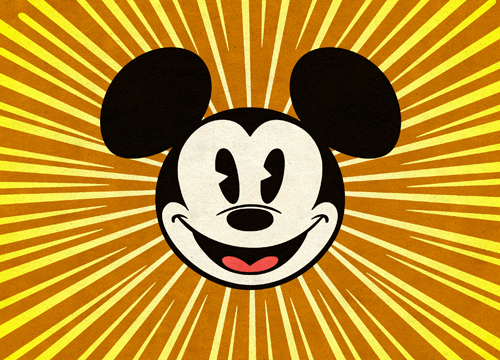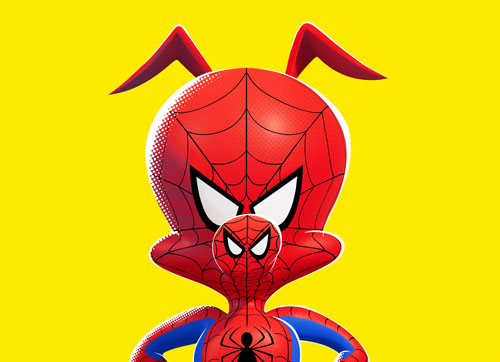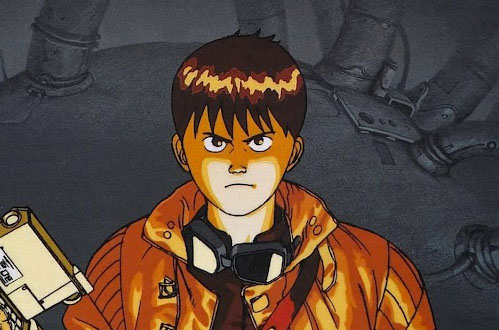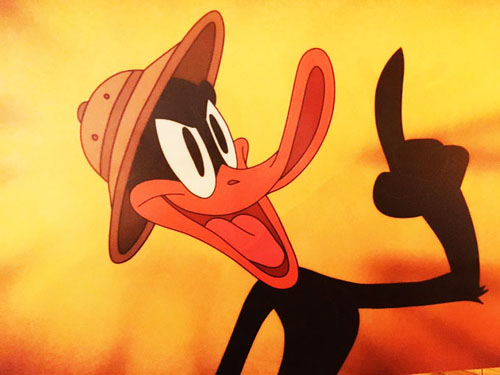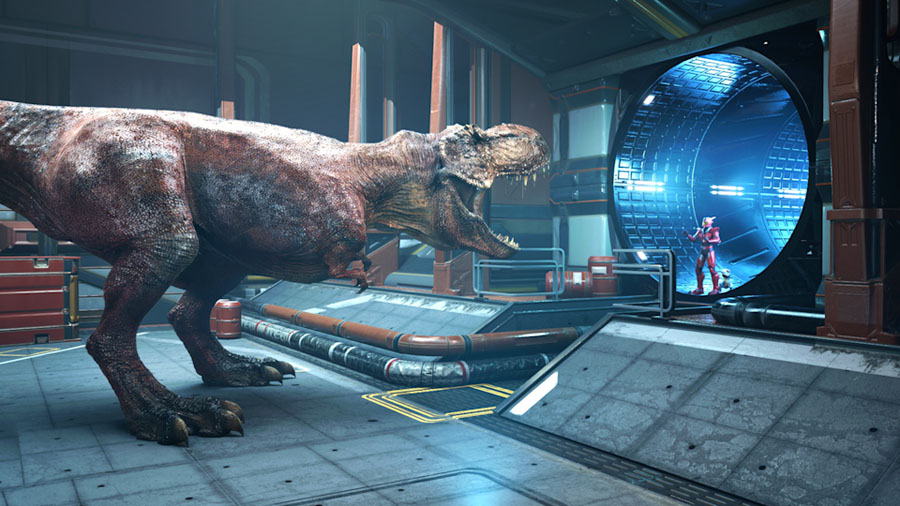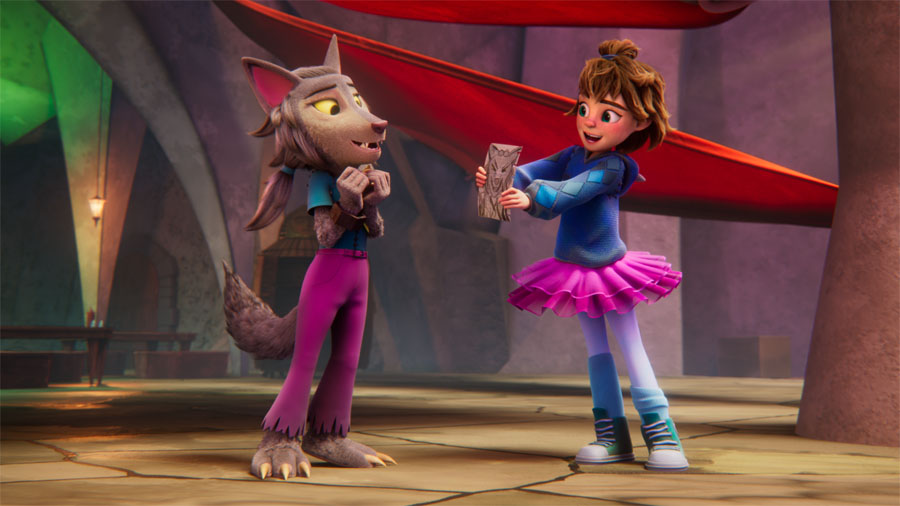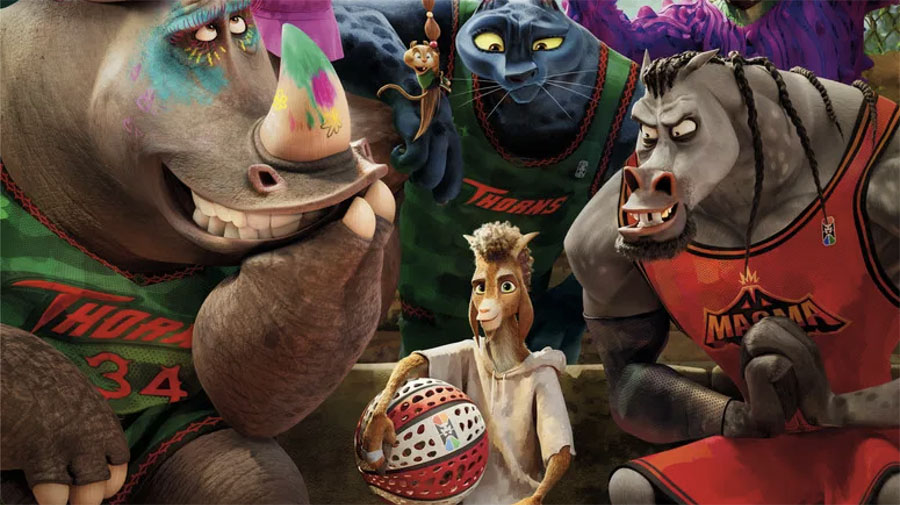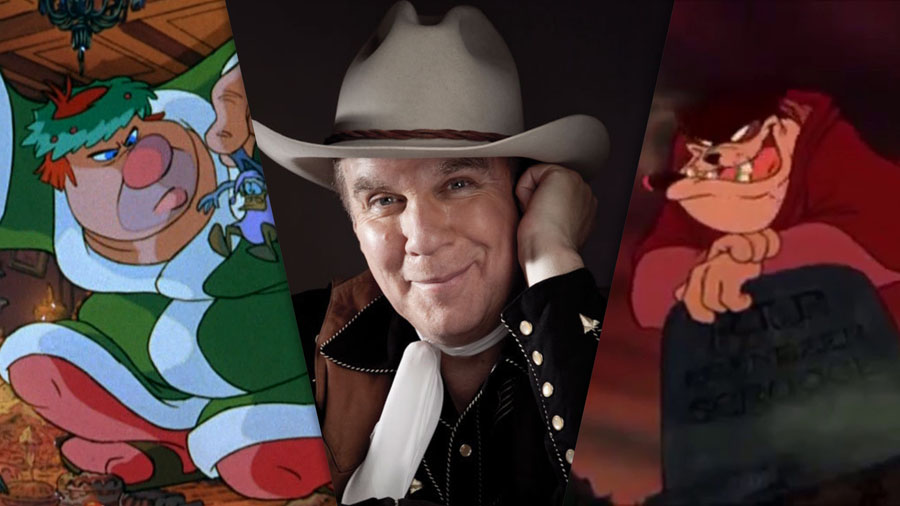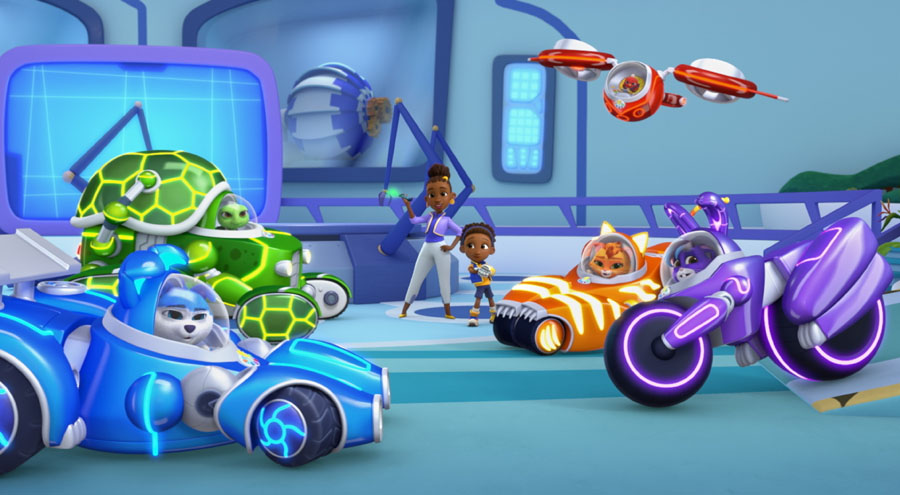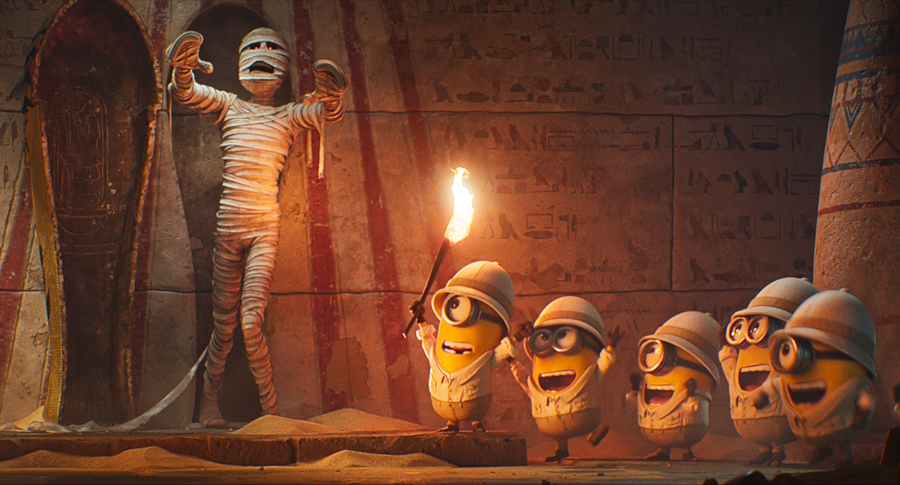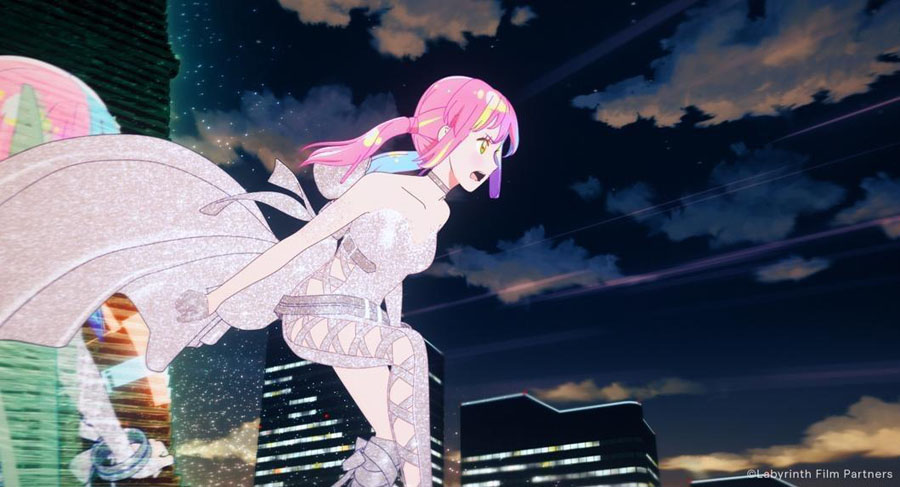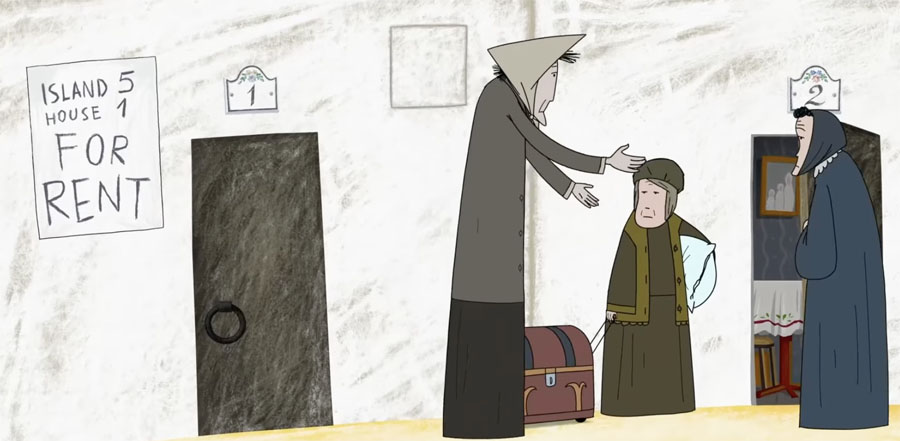Usually an actor books a role after an audition. But there are times when actor is chosen because of their reputation, without an audition. Such is the case with the American cast of Poupelle of Chimney Town. The film stars Antonio Raul Corbo.
Stephen Root voices Lubicci’s father, Bruno, who tries to inform people that above the cloud canopy, there exists a sky full of stars, though his efforts are undermined by Chimney Town’s ruling class.
Misty Lee voices Lola, Lubicchi’s mom, who despite her poor health, tries to raise Lubicchi the best she can. Tony Hale voices Poupelle, a sentient mechanical man made of garbage, who on Halloween night ventures into Chimney Town and crosses paths with Lubicchi. Together they must find a way to reach the sky above the clouds, and reveal it to the people on the streets below.
I spoke with Root, Corbo and Lee over Zoom on October 25th, 2021.

Bob Miller: For Poupelle of Chimney Town, you had to loop the dialogue. [Automated Dialogue Replacement, ADR] But ADR is different from pre-lay. How did you adjust your technique or performance for ADR for specifically for this project?
Stephen Root: What was different about this project is you’re not going by rhythms. I do a lot of voiceovers and layover stuff by rhythms, ’cause I can hear it really well. Obviously you can’t do that with another language, so you had to do it visually with lip flaps and that was much much different. That’s what the challenge was for me, was finding a very simple way to do three words in a bop in one lip flap.
Antonio Corbo: To get into dubbing was actually very hard ’cause I talk very fast and having to get synced up with everything was kind of hard. But once you get used to it, it’s kind of like a rhythm, and I’m a musician. So rhythm is my thing. It gets easy as it goes on.
Miller: How did you find out about this film? And how did you prepare for the audition? This is a question for both of you.
Corbo: I was offered this.
Root: I was as well.
Corbo: They just wanted to hear my voice and see how it was, but I was offered it, yes.
Miller: So, based on your reputation, you actually landed the role that way.
Corbo: Yeah, I think that’s it.
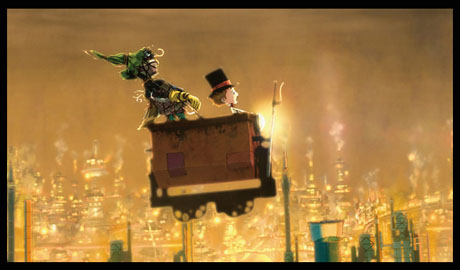
Miller: What about you, Stephen?
Root: Same thing. Hopefully they had heard other work that I’d done and thought I could probably pull this one off. It’s funny, work seems to beget work as you continue to do it. So as you get more well-known you get some offers, and of which this was a fantastic offer. After seeing even a little bit of the animation on this film, I realized that I had to be involved in it. It’s just so beautiful.
Miller: Yeah, it is. The animation is really intricate in this thing. You played Bruno. As I was seeing the film, his voice was very close to the voice of the Garbage Man, which was—
Root: Tony Hale.
Miller: Tony Hale. And it is essentially the same character, as it turns out. Did you listen to his performance to match his performance?
Root: No, not really. You just have to have a sense of what’s on the page. And what’s on the page is a caring father. And the Garbage Man is a caring person too, and Tony Hale’s character as well. So you’re playing the truth of your character and if it turns out similar it should, because they’re related in terms of emotionality.
Miller: So your two characters had a rapport as father and son. Did you record separately?
Root: We did it separately.
Corbo: Yes, we did it separately.
Root: We had longer sessions. So we had a chance to do different versions of the line. We’d do three or four versions of the line that would fit into what Antonio was doing or he’d fit into what I was doing.

Miller: Did you actually reference each other’s performances?
Root: No.
Corbo: I didn’t get to hear him.
Root: Yeah, we didn’t get to hear each other’s first. We’d do different versions of the lines so that they can match them up when they do that in the editing room.
Miller: So you trusted the director to make sure your performances blended.
Root: You always have to trust your boss. (laughs)
Miller: Did they, first of all, show you an image of the character that you’re going to perform?
Root: Oh yes, definitely. They had a whole visual book to look at in terms of reference material that they put on a deck, as they called it. And you’re able to see all the characters, how they’re described in the movie, and a picture of them, and scenes from them in the movie. So we had lots of reference material.
Miller: Okay. Did you listen to the Japanese actor of your character?
Corbo: Yes, a lot.
Root: Mm-hmm.
Miller: Did you try to mimic his cadence? How much freedom did you have to put in your own creative stamp on it, on the character?
Corbo: I think I kind of based it off [the Japanese actor], but I after a certain point I kind of took it in my own direction. But the original voice actor did such a stunning job, I was crying when I was watching the movie.
Root: Yeah. Just even listening to it and not able to understand it other than the subtitles was astonishing. They’re great, tremendous actors. You know, there’s difference in the amount of words said. So you can’t rely specifically on rhythm, but it certainly plays a part.
Miller: Yeah, well I would think the challenge is, A), you gotta match the lip flaps and, B), you gotta put in a believable performance. Would you like to talk about that?
Root: Well, I think it was easy for me just because the story was so good. And that’s the reason I choose a lot of projects now is, is the script tremendous? Is the script beautiful? And then it’s who you want to work with. But in this case, since it’s dubbing, a lot of it was about the script, which I thought was great. And then you add on top of that the animation, and it makes you want to do the project.

Miller: Antonio, was it difficult for you to learn dubbing?
Corbo: I think the first week was challenging. I like challenges. It was different. I really liked it. After that, it wasn’t easy, but I was getting more used to it, and I liked it a lot. It was really cool.
Root: And for me, I always want to learn something new, whatever I’m going into, and for this it was brand new. So it was tremendous to be able to learn something else.
Miller: So for the both of you, was this project your first time at doing dubbing?
Corbo: For me, yes.
Root: For me it was, yeah, mm-hmm. First time.
Miller: Now, when you recorded, did you record in your own home studios, or did you record at a regular studio?
Root: Regular studio for me.
Corbo: Yeah, a lot of regular studios. There was four different ones that I went to.
Bob Miller: Misty, how does your background as a magician carry over into your voice work?
Misty Lee: My background as a magician carries over into my voice work, in that, Number one, it makes me incredibly grateful to not have to hook up a trailer and coordinate six schedules to go to work. Number two, it also readied me to work with a team and to be ready for anything. And as a magician, you tend to flowchart out, “Okay, well, if this goes wrong, then we’ll go this way, if that goes wrong, then we’ll go that way.” And the more working in magic I did, you just can’t prepare for everything. And so, improv became key, and that improvisation is an enormous life lesson as well as a theatrical boon.

Miller: Your character, Lola, is an invalid. She’s sitting in a wheelchair. Did you have to sit down to emulate her physicality when you performed her voice?
Lee: No, I recorded this whole thing standing up, and that’s not to say I couldn’t have recorded it sitting down, but the way that my booth is configured, I had to stand up in it. (chuckles) Which was a challenge, because you want to honor her posture and the way that she looks, and honor the things that she’s feeling and the hardships that she’s going through. So, all of those ragged breaths and all of the wheelchair efforts and all of those things, are things that we had to create with me standing. Thank goodness, I’ve worked with wonderful people like Frank Welker, so that I know how to make myself run without getting actually out of breath and making foot noise on the floor and things like that. And I had a great director in Jamie Simone [voice director] and Geoff [Geoffrey Wexler, producer] also knew what he was doing. So, it was kind of a less-is-more situation, and you really want to pay close attention to, like I said, to honor what the character is enduring, and it was kind of a challenge to record that at a different posture.
Miller: Did you reference the Japanese performance?
Lee: They showed us the Japanese performance, and we were able to hear because we had to match the lip flaps. The animation was already done to the original Japanese track, which is an incredible challenge, and you want to honor both the significance of the scene, the story they’re trying to tell, but also the technical side. You’ve got to make sure that you’re ending at the same time those mouth flaps do. So they would show us the dub, and that’s just part and parcel with doing this kind of work. When you’re putting an American track to a previously existing Japanese film, you gotta do all of that and you have to make it matter. You’ve got from here to here, and then you use your eyeballs to make sure that it all kind of links in. It’s not an easy job. It’s a fun job—but it’s not an easy one.
Miller: Well, I can imagine, ’cause not only are you matching lip flaps, but you’ve got to deliver a performance on top of that.
Lee: And within the allotted timeframe that the original actor established. And someone actually has to take that script and break it down, and give it meaning, and honor the magic that was originally there in another language. It’s incredible the amount of work that goes into this thing.
Miller: Well is this the first time you’ve dubbed for overseas animation?
Lee: It’s not. This is the second time that I’ve dubbed. I’ve never done a feature so this is a big deal and I’m really excited about it, but I also do Aggretsuko about a little red panda who sings heavy metal. I play a character called Kabae, and she’s this little happy hippo, and she’s really a lot of fun, but those lip flaps are not as exact ’cause she’s got this giant hippo mouth that just opens, and half the time she’s talking but (in character) her mouth is just wide open. (chuckles) It’s just for comedic sake. This is a completely different animal, but it’s really exciting. It’s on Netflix.

Miller: Sounds like fun.
Lee: It so is. Listen, I can’t believe we get paid for this.
Miller: Misty, when they notified you about it, how did you prepare for the role?
Lee: I didn’t know what to expect. Mine was booked off demo, meaning Geoff heard my voice in a pile of a lot of other voices, and I just got really lucky that he was the one that said, “I think that’s Lola,” and they put it through and they all said, “Yeah, we like that voice a lot.”
So this wasn’t something that I had copy to break down and reference, and when I booked it, I was like, “How did I get this job?”
And they were like, “He booked it off demo,” meaning, he heard everything he needed to know in my animation reel, which is so lucky for me because there’s so much for Lola to do. It’s crazy. And she is such a heartfelt, beautiful character. I don’t know what he heard, ’cause I asked him specifically and he was like, “You know, I don’t remember what spot it was. I only remember that’s how it went.”
There wasn’t really much preparation going in. I don’t even know if they sent the script ahead of time. For me, it was feeling all of this in real time, and this is an incredibly meaningful, heart-felt movie that so many of the actors just bring their heart and soul to, Antonio included, and Stephen Root absolutely does. And it’s just heartbreaking. And so I was feeling that stuff in real time, and I am very grateful for that in many ways, because I think that it was a privilege to be in it. I don’t know that it would have been harder to be in it, if I’d received the script ahead of time, but it would have been a different “in it,” if that makes any sense.
Miller: So both you and Antonio and Stephen have said that you didn’t have to audition. You just basically booked the role from your demos, right?
Corbo: Yeah, you’re right, and I didn’t know that that’s what happened with everyone else. That’s very cool. Wow, I didn’t know that.
Miller: Do you have any last words, either about this movie, or your career?
Corbo: What I really want people to take away is that you can do anything you put your mind to no matter what. And also, this is a very big thing that no one really notices. There’s a lot of Easter eggs and secrets in this movie. I’m not gonna tell you any of them because I want you all to find them. There are a lot of them that I didn’t even know about until after the fact, because Geoff told me.
Lee: Even in the end credits.
Corbo: Even in the end credits, yes.
Miller: Okay, where can I find out?
Corbo: We can’t tell you.
Lee: Are you going to tell him, Antonio? Are you going to give him one?
Corbo: I’ll give you one hint. Look at the clocks. All the clocks. Look at the clocks. That’s one of the hints. That’s all I’m going to give you.

Poupelle of Chimney Town, directed by Yusuke Hirota and animated at the acclaimed Studio 4°C, had its Japanese release in December 2020. Eleven Arts acquired the distribution rights for North America, and premiered the English-language version at the “Animation is Film” Festival on October 23, 2021.
Poupelle is scheduled for general theatrical release on December 30. For the 49th annual Annie Awards, ASIFA-Hollywood has nominated the film in the category of Best Music-Feature, for composers Youki Kojima and Yuta Bando.
Special thanks to Hilda Somarriba, Prism Media Group.
